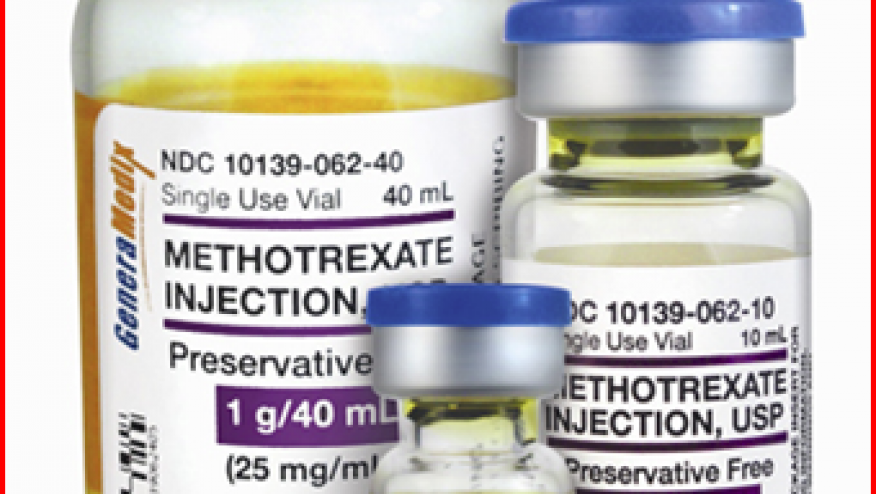Methotrexate significantly lowers Systolic BP Save

Australian researchers have shown that methotrexate (MTX) has another secondary, beneficial effect by significantly lowering systolic blood pressure, and contributes to its well docuented cardioprotive effecs.
A new study led by Flinders University and Southern Adelaide Local Health Network (SALHN) researchers, has shown that methotrexate significantly lowers systolic blood pressure when compared to another arthritis drug, sulfasalazine (SSZ). In a six month trial, 62 newly diagnosed, treatment naive RA patients were randomized to either parenteral methotrexate or oral sulfasalazine.
At baseline the 2 groups were equally matched - subcutaneous methotrexate (Group 1, n = 31, age 57 ± 15 years, 65% females, Disease Activity Score-28 – C-reactive protein, DAS28-CRP = 4.7 ± 1.2) and the SSZ comparator (Group 2, n = 31, 54 ± 17 years, 61% females, DAS28-CRP = 5.0 ± 0.8). The primary endpoint was systolic (SBP). Other measured included diastolic BP (DBP) and augmentation index (AIx, a marker of arterial stiffness) (ClinicalTrials.gov: NCT03254589).
Lead author of the study, Professor Arduino Mangoni, from Flinders University’s College of Medicine and Public Health, and SALHN’s Department of Clinical Pharmacology, says they wanted to see if methotrexate could lower systolic blood pressure, which indicates how much pressure your blood is exerting against artery walls when your heart beats.
“We found that methotrexate lowered systolic blood pressure by an average of 7.4 mmHg compared with people taking sulfasalazine,” says Professor Mangoni, Strategic Professor of Clinical Pharmacology. “We’ve known for a while that methotrexate helps with inflammation, but now we’re seeing that it may also help lower blood pressure, which is a major risk factor for heart disease,” he says.
At 6 months, MTX patients had significantly lower SBP (−7.4 mmHg, 95% CI −14.0 to −0.8, p = 0.03). By contrast, there were no significant between-group differences (MTX vs SSZ) in DBP (p = 0.18), AIx (p = 0.85), or DAS28-CRP (p = 0.16). A significant effect of single nucleotide polymorphisms (SNPs) rs1801133 (methyl tetrahydrofolate reductase) and rs2231142 (ATP-binding cassette subfamily G member 2) on BP changes during methotrexate treatment was observed.
“In short, if someone has specific gene variants, methotrexate might add a heart health benefit to its usual role in treating rheumatoid arthritis by the positive effect on blood pressure,” he says.
The researchers say that this opens the door to more personalised treatment options, where doctors could use genetic testing to predict who might benefit most from methotrexate’s heart-protective effects.
The BP benefit did not seem to be linked to changes in either arthritis symptoms or the stiffness of arteries, suggesting that it might be helping the heart via other mechanisms.
“The results suggest that this well-known arthritis drug could also play a role in protecting heart health, especially in people who are at higher risk due to inflammation,” says Dr Tommasi from the College of Medicine and Public Health and South Adelaide Local Health Network.
The research, ‘A controlled comparative study of the effects of methotrexate and pharmacogenetic factors on arterial blood pressure and arterial stiffness in patients with rheumatoid arthritis’, by Arduino A. Mangoni, Michael D. Wiese (University of South Australia), Richard J. Woodman, Salvatore Sotgia (University of Sassari, Italy), Angelo Zinellu (University of Sassari, Italy), Ciriaco Carru (University of Sassari, Italy), Julie-Ann Hulin, E. Michael Shanahan and Sara Tommasi, was published in Annals of Medicine journal. DOI: 10.1080/07853890.2025.2539311










If you are a health practitioner, you may Login/Register to comment.
Due to the nature of these comment forums, only health practitioners are allowed to comment at this time.